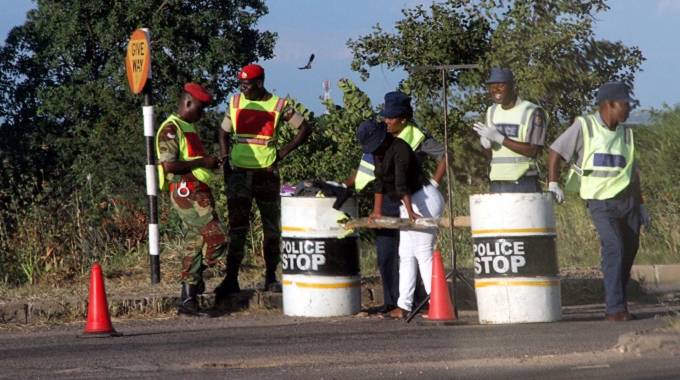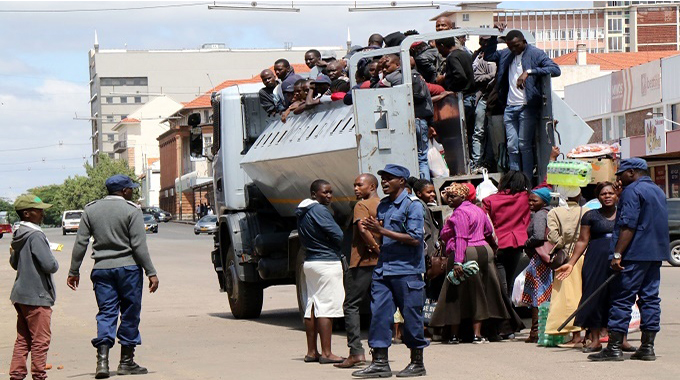Zimbabwe lockdown hurts informal workers struggling to survive
By Prince Njagu
The announcement by President Emmerson Mnangagwa to put the country under a 21-day lockdown to stem the spread of the coronavirus was welcomed by many at first but over 96 percent of the country’s informal workers are already feeling the pain.

A few days into the lockdown cases of security forces abusing citizens have started surfacing. Videos and images of security forces beating unarmed citizens have already populated the internet.
According to an Al Jazeera publication, Zimbabwe Lawyers for Human Rights (ZLHR), executive director Roselyn Hanzi had confirmed receiving complaints about police harassment and coming across videos circulating on social media showing security forces assaulting civilians.
Hanzi said that the constitution was very clear with regards to some rights being limited during the lockdown, but also emphasised that some rights are never limited no matter the circumstances.
The police are supposed to be working hand in hand with citizens and as a fourth arm of the state; they should be there to enforce legislation, not abusing citizens. The ZANU PF government has remained silent even after outcries from the citizens.
Police going rampant in the streets beating helpless citizens affirms all those concerns which were previously raised on how the security forces are used in acts of human rights violations.
 The new ZANU PF administration under Mnangagwa is cut from the same cloth as the one under Robert Mugabe when it comes to respect for human rights and use of the security forces in getting things done.
The new ZANU PF administration under Mnangagwa is cut from the same cloth as the one under Robert Mugabe when it comes to respect for human rights and use of the security forces in getting things done.
Such stiff and recklessness measures being employed by the security forces risks clashes with the citizens.
Most Zimbabweans earn a living through working in the informal sector, and it has been a wild-goose chase between security forces and self-employed citizens who have been found wanting.
The way the lockdown has been implemented in Zimbabwe is chaotic. The ZANU PF government has not set aside any meaningful measures to help its citizenry during these difficult times.
A 2019 Al Jazeera report shows that 96 percent of the Zimbabweans youths hold informal jobs and that is the only means for them to sustain their lives since they are no professional opportunities available.
The informal, unregulated economy forms most of the Zimbabwean populace’s livelihood. The government should act swiftly to help these people as they are facing starvation and now finding it hard to abide by the 21-day lockdown decree.
The same 96 percent working in the informal sector fall within the non-essential service providers category and they have been forced to stay at home with no form of government assistance.
According to a Statista February 2020 report, the unemployment rate in Zimbabwe from 1999 to 2019 averaged at 4.9 percent.

These figures are however in sharp contradictions to statistical figures on the ever-booming inflation, job losses and company closures.
The country is already faced by a surge in poverty, acute food shortages from the prevailing economic crisis and crippling effects of the El Niño-induced drought. A lockdown with no assistance from the government only worsen the situation.
World Bank figures show that poverty in Zimbabwe has been on an upward surge, from 29% in 2018 to 34% in 2019. These figures are anticipated to continue rising in 2020 and a lockdown does not make the situation any easier.
The 96 percent of the people working in the informal, non-essential jobs sector who have been told to stay at home are the very same people who were scraping to earn a living in the urban areas and feed their starving families in the rural areas.
5.5 million Zimbabweans in the rural areas had already been reported as facing starvation before the lockdown, these figures will increase as the urban working people are under lockdown.
In December 2019 The World Food Programme (WFP) had indicated that more than one-third of the rural population in Zimbabwe had become food insecure by October 2019.

Non-governmental organisations have been helping with food aid in these rural areas, but the outbreak of covid-19 and a lockdown has seen all operations ceasing.
It is high time that the government steps up and perform their duty to provide for their citizenry. The government should do more than just call for a lockdown. They should also provide financially to cushion against the impacts of covid-19 like what other governments are doing.
At a time when the world is being faced by a global pandemic and the number of covid-19 infections in the country is on the rise, the Mnangagwa administration has not done much to better the lives of Zimbabweans.
There has been extreme partisan alignment of the security forces towards the ZANU PF political party and these same uniformed forces are being deployed to manhandle the already starving citizens during the lockdown.
There have been several calls from the international community for the Mnangagwa led ZANU PF to uphold human rights and refrain from the use of violence, but recent actions from the police and denial of such things happening by assistant police commissioner, Paul Nyathi tells a lot about the human rights situation in Zimbabwe.
The Zimbabwean people have had to endure long periods of suffering under regime of the late President Robert Mugabe, and his successor Emmerson Mnangagwa is proving to be the same.
Repression and other human rights violations are still the talk of the day in Zimbabwe and the lockdown has somehow acted as a green light for the police to go around harassing the citizenry.
Amid this global pandemic and a deteriorating economy, the ZANU PF administration should be preaching the message of unity amongst all its citizenry irrespective of political affiliation.
Zimbabweans are already buckling under the weight of the economic crisis, a lockdown which is marred by security forces abuse will likely spark clashes with the people.






